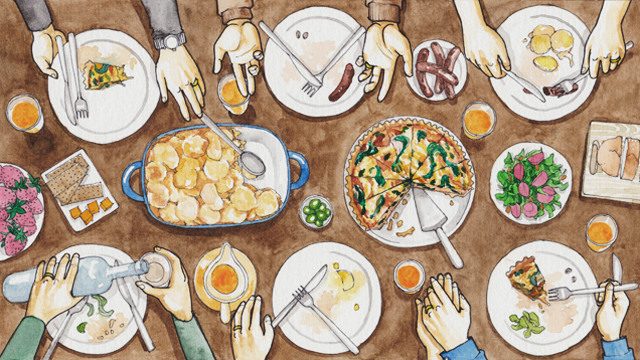SUMMARY
This is AI generated summarization, which may have errors. For context, always refer to the full article.
 Once or twice a year, we serve our traditional brunch fare of quiche and potato gratin, preferably when the weather is cold so the oven-intensive cooking is most welcome. We usually invite a couple of dear friends because the meal is too hearty for two and best served over bottomless mimosas, coffees, and overdue conversations.
Once or twice a year, we serve our traditional brunch fare of quiche and potato gratin, preferably when the weather is cold so the oven-intensive cooking is most welcome. We usually invite a couple of dear friends because the meal is too hearty for two and best served over bottomless mimosas, coffees, and overdue conversations.
The other weekend, we hosted two gay couples we’ve known for about a decade. Our dear friends Michael and Jonathan moved to our borough a few years ago, and are now deeply vested in the act of “nesting” – a term referring to how couples (usually lesbians) spend most of their time at home decorating and cooking (in other words, keeping nest). They said they can’t wait for the warmer months so they can host us on their apartment’s deck.
Jim and Martin made the trek from Manhattan to see our home for the first time. They said they wanted to come back the following week to maybe start a mah jong group with some of our other friends. (We have definitely turned into our parents. Be warned.)
A good realization
Midway into the meal, plates smeared with pastrami and lox, I noticed that we were all wearing wedding rings. Michael and Jonathan married in 2013, while Jim and Martin married last year. Just like our day in 2012, all of us were married in minute-long ceremonies in City Hall with not a lot of frills, but with a lot of meaning.
Like in any other circle, there are hardly any marriage conversations at the table once its occupants have passed that milestone. We are all old friends and have seen each other through the years – past our twenties, through our thirties, and now into our forties. Being homegrown Filipinos, Michael, Jim, my wife, and I joke around in Filipino and recreate the latest beauty pageant Q&A fails. Jonathan and Martin, the boys’ white husbands, wow us with their new Filipino expressions, like “Talaga?” “’Di ba?” and “Chos!”
Looking around the table that day, I couldn’t help but be touched by the fact that we’d all settled down. It wasn’t because of the fact that we all found our partners – we all knew that from day one. I was touched that after over 10 years of waiting, we were finally given the same rights and benefits available to other committed couples – the same rights that our counterparts in the Philippines will likely not see in their lifetimes.
Before we had the benefit of marriage, an ongoing topic was how to protect ourselves financially should anything happen to our partners because the law didn’t yet provide us equal protections for our relationships. Now, if one were to sit in on these conversations, they would be bored with the grownup talk of real estate, tax rates, investment accounts, and retirement options.
Marriage promotes promiscuity?
It is often said that gay marriage promotes promiscuity and obscenity because legalizing same-sex relationships is believed to validate these values. In my experience, that couldn’t be further from the truth. One after the other, gay and lesbian couples around me are marrying in intimate ceremonies where most of their friends and family members cry. Especially with the boys, there are beautiful suits and elegant motifs. I’ve seen the changes in my friends before and after their marriage ceremonies and I’ve only been touched by their experiences the way I have been touched by my own legalized commitment.

Allowing gay men and women to form serious commitments promotes monogamy and stability. It teaches couples that there is a concrete future other than fleeting encounters. It opens up the world of legal commitment, marriage, financial stability, family, and children. It used to be that LGBT people are conditioned from childhood to believe that their lives and relationships will never be accepted as valid. Now that same-sex marriage is legal in the US and other developing nations, it shows queer youth that there is an endpoint, an actual goal to aspire to. It teaches them that it is possible to march down an aisle and proclaim his or her love for someone else to the world.
Marriage makes people less erratic and less likely to take risks or engage in dangerous behavior. Insurance agents will tell you that readily, and gay people are not exempted from this phenomenon. While marriage definitely doesn’t guarantee that a couple will stay together till death, it is a given that this commitment assumes that both parties work towards a shared goal to keep their relationships healthy and fruitful.
On the other hand, telling a sect of people that they are not allowed to partake of that commitment and that their relationships will never be recognized or protected by law actually sends the message that only transient, shallow relationships are allowed. It promotes risky behavior and does not prioritize financial stability or family building when people are told that their relationships are pointless, illegal, or inferior.
For same-sex couples who have had enough practice as unmarried partners, I can safely say that many of us who eventually got married will be together for life. Many of us who never get the chance to marry will still be together as well. For the latter, a piece of paper will not make a difference in how much they love each other, but it will make a huge difference in being able to own and share property, visit each other in the hospital, or pass on an inheritance should one die.
‘How’s the married life?’
Michael and Jonathan, two of our closest friends, once told us that they decided to marry after being inspired by our own experience of marriage. So lately whenever we see them, we ask how married life is and how it has changed each one and how they relate to each other.
They take turns in saying things like, “It feels permanent,” or “It reminds me that I can’t only think of myself and that I have another person to consider in my decisions now.” Sometimes, when we ask them our usual “How’s the married life?” they simply look at each other, say “Awww!” turn red and give each other a hug. At that point, my wife and I both get teary-eyed and feel incredibly honored to be around this kind of love.
I don’t understand how anyone can think ill of our commitments and relationships before even getting a chance to know how similarly we love each other and build our lives together. I fail to see why some people’s first reactions to our relationships are those of disgust and disapproval, or an absolute doubt that the love we share is real or lasting.
It doesn’t really make a difference to us whether we have everyone else’s approval or not. A “piece of paper” now proves we are legally equal to everyone else, and their opinions will not change that.
Your gatherings are no different
In our brunches, meals, and other gatherings, the usual conversation topics range from how good the food is, when our mah jong session will be, and when we can schedule our roof deck barbecue. Aren’t these the topics in your heterosexual gatherings as well?
Between married gay couples, there isn’t much difference with how you all live, love, eat, and pass food around the table. The difference is that many still think we are doing horrible and sinful things, destroying families, and promoting unhealthy lifestyles whenever we marry or come together, when the reality is that we’re really just talking real estate and politics at lunch – doing ordinary things as ordinary people, just like you. – Rappler.com
Add a comment
How does this make you feel?
There are no comments yet. Add your comment to start the conversation.